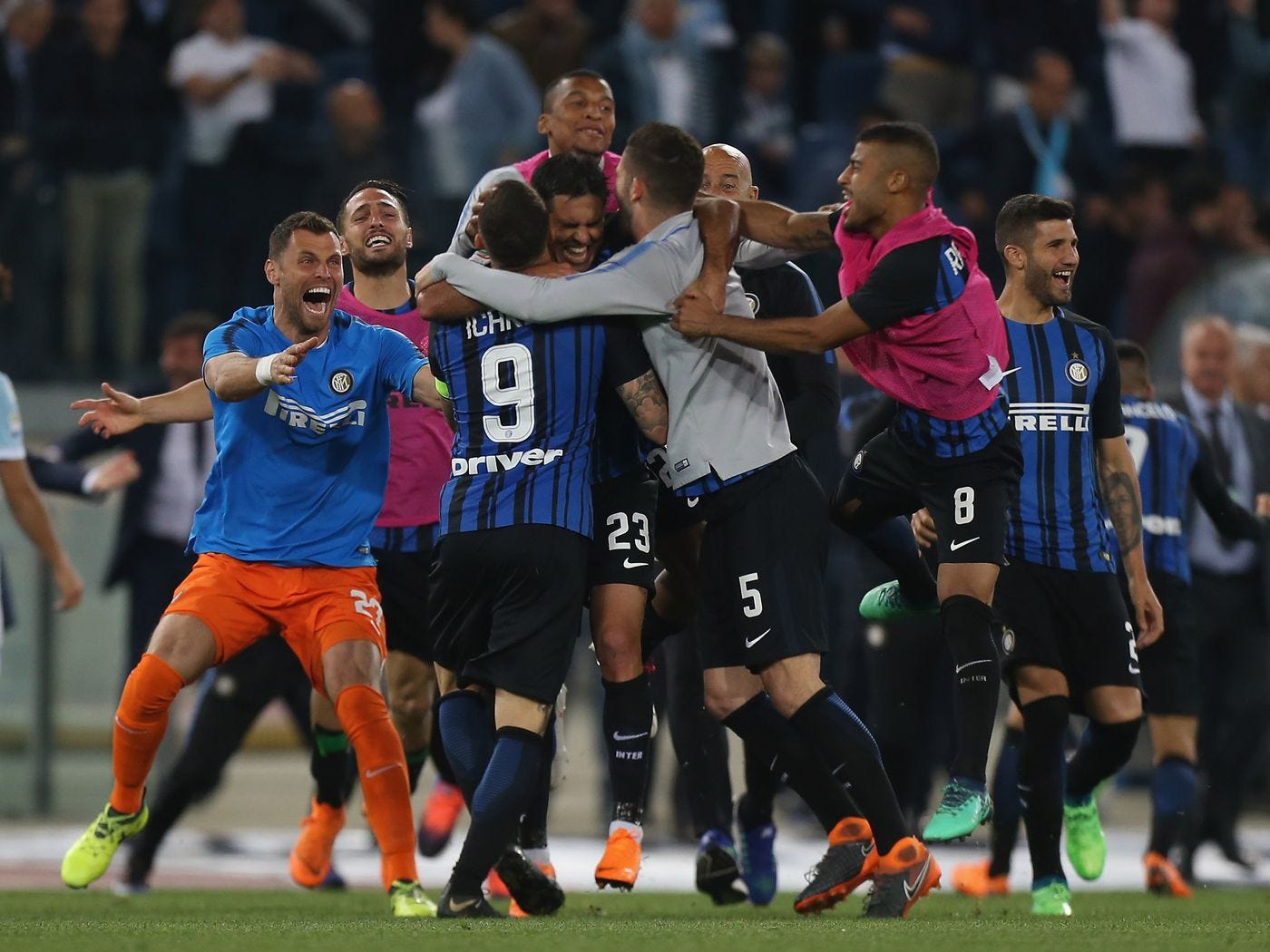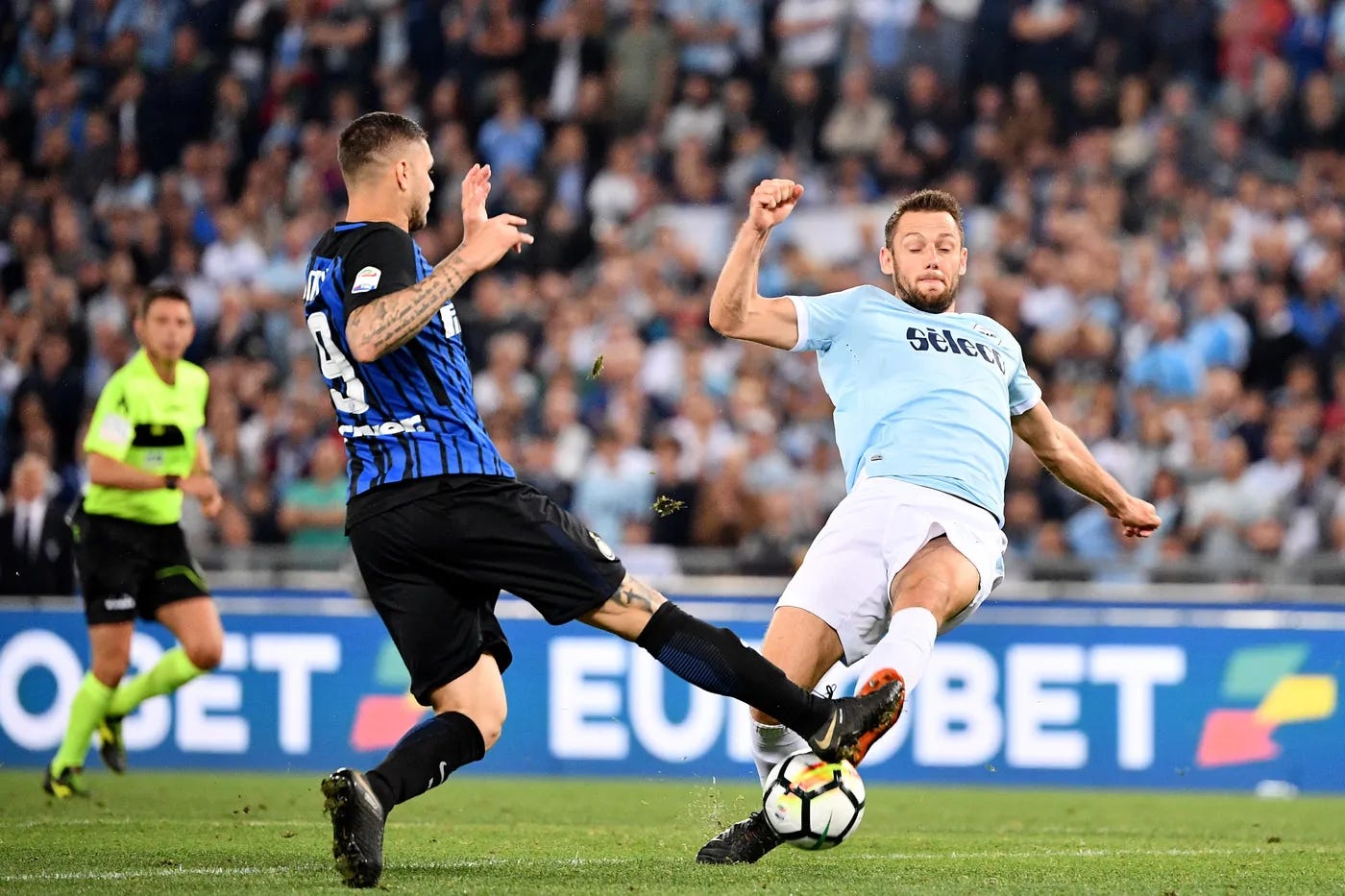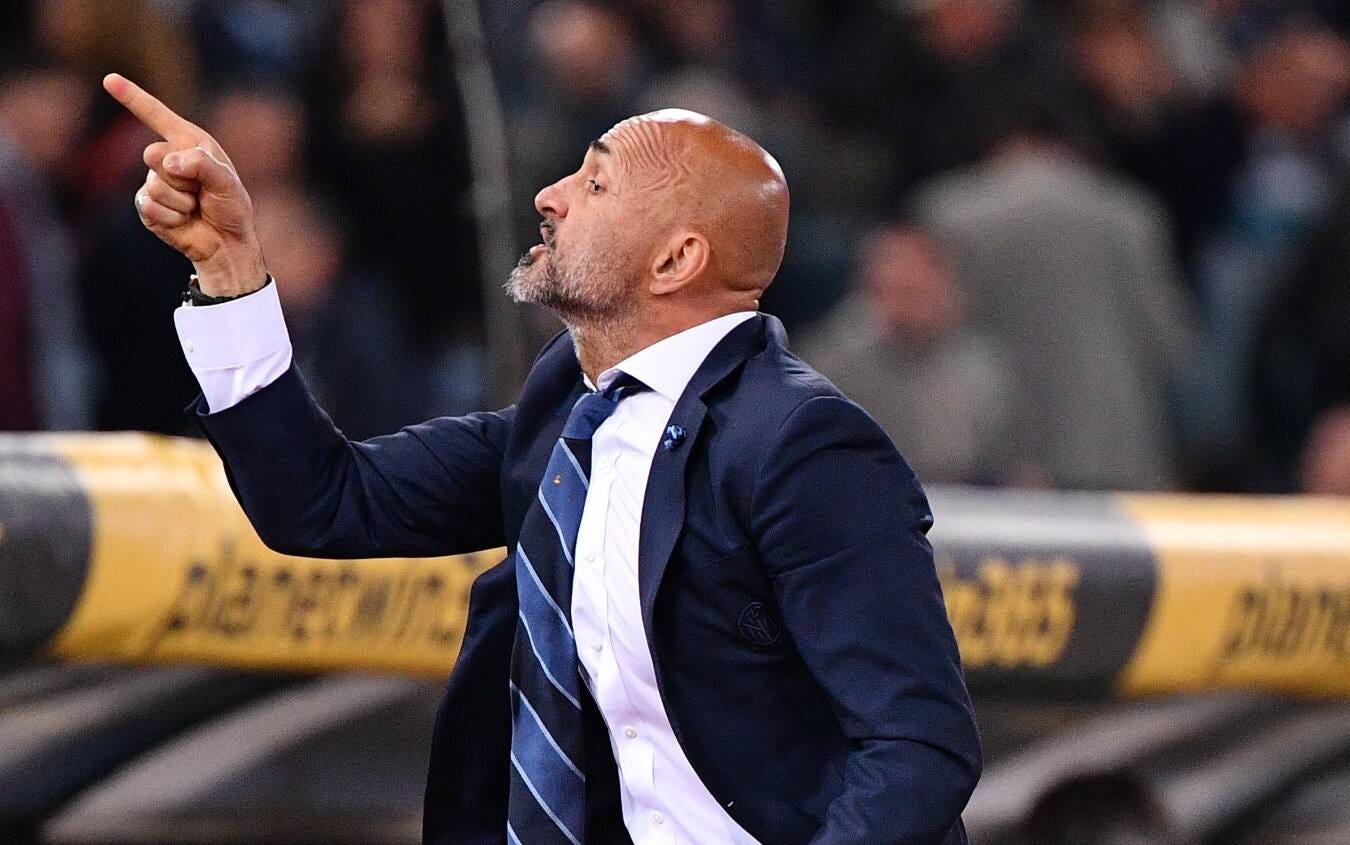Introduction
It’s Champions League week again, and as an Inter fan, I don’t take it for granted anymore—especially after those six nightmare years from 2012 to 2018 (basically my entire adolescence) when Inter was absent from the competition. What felt so weird at first eventually became the norm: the Champions League without Inter or Milan. But now, thankfully, those dark days are behind us.
The 2016-17 season was a particularly low point. Despite years of investment into players (most of whom failed to justify the cost), Inter was locked in battles with UEFA over Financial Fair Play, leading to penalties that drained the club further. We finished 7th, a staggering 24 points behind the Champions League spots, and for the third time in six years, we would miss out on European football altogether. It was a chaotic season, with four different managers at the helm and painful defeats to Champions League contenders like Napoli and Roma.
Then came the 2017-18 season—a rollercoaster of emotions, more like a film than a football season. It all culminated in my greatest football memory on May 20th, 2018, at the Stadio Olimpico: an unforgettable game that felt like a playoff, where Inter had to win to leapfrog Lazio and secure the 4th and final Champions League spot. The match ended in a thrilling 3-2 victory, a night of eternal glory that I'll never forget.
The 2017-18 Season
After the disappointing end to the 2016-17 season, changes were inevitable. Luciano Spalletti was brought in as the man to lead Inter back to the Champions League. Spalletti had built a reputation during his time at AS Roma, where he regularly competed for the Scudetto, especially in the post-Calciopoli years. One of his most notable tactical innovations was the use of Francesco Totti as a false nine, which saw the Roma legend win the Golden Boot in 2007.
Following a stint at FC Zenit Saint Petersburg, Spalletti returned to Roma in 2016 for another Scudetto challenge—this time against Juventus. While his tenure was marked by good results on the field, it was also marred by a high-profile falling out with Totti, a drama that still leaves some Roma fans bitter. Nonetheless, Spalletti’s work at Roma was undeniably strong, and the club has struggled to reach the same heights since his departure in 2017.
Spalletti's objective was clear from the start: bring Inter back to European competition, especially the Champions League. He initially seemed like the perfect man for the job, leading Inter to an impressive unbeaten run in their first 16 games. They secured strong results against top teams, particularly away from home, which gave fans hope of a real title challenge. However, a sudden two-month winless streak halted Inter's momentum and saw them fall out of the title race.
The turbulent period during Inter's winless streak hit some players harder than others. One of the most affected was Marcelo Brozović, who faced significant criticism from the fans and was even on the verge of a January transfer to Sevilla in 2018. However, Spalletti made a pivotal tactical adjustment, deploying Brozović as a deep-lying playmaker. This decision transformed his game and turned Brozović from a player on the way out to one of the best in his position, consistently drawing man-marking attention from the opposition.
After the tactical shift, Inter began to find their rhythm again, stringing together some dominant performances. However, the season was still filled with ups and downs. The most painful low came during the loss to Juventus at San Siro. Despite going down to ten men and still leading in the second half, Inter saw Juventus make a dramatic comeback in the dying minutes, sealing a win that pushed their Scudetto hopes forward. That defeat still stings to this day.
Another bitter moment came in the penultimate game against Sassuolo, a team that had consistently troubled Inter. The loss was painful, especially knowing that Lazio, if victorious the next day, could have rendered the final game irrelevant. Fortunately for Inter, Lazio, battling injuries, were barely managing to crawl to the season’s end.
Then came the final day: Lazio vs Inter at the Stadio Olimpico. It was essentially a play-off for the last Champions League spot. To this day, I’ve never seen the Olimpico so packed, full of famous faces, and buzzing with anticipation.
Despite witnessing several finals and unforgettable moments with Inter over the years, I had never experienced emotions like the ones I felt before this match. The stakes were incredibly high, and it was impossible to shake the feeling that this game was about more than just qualification—it was about pride, redemption, and a return to Europe’s elite stage.
The Game
It's almost hard to believe that the man who suffered that heart-wrenching loss on the Lazio bench, Simone Inzaghi, is now Inter's current manager. Back in 2018, Inzaghi was already building something special at Lazio, deploying his favored 3-5-2 formation. Ciro Immobile was leading the line, neck-and-neck with Mauro Icardi for the league’s top scorer title, while Luis Alberto was dazzling fans with his creativity and Sergej Milinković-Savić was delivering some of the best performances of his career, arguably Lazio’s standout player that season.
On the other side, Spalletti’s Inter stuck to a 4-2-3-1 formation. João Cancelo was wreaking havoc down the right wing, Perisic provided width on the left, while Brozović pulled the strings in midfield. Up front, Icardi spearheaded the attack. Defensively, Inter was solid as a rock, with Miranda, Škriniar, D’Ambrosio, and Handanović forming a reliable wall at the back. The addition of Rafinha, who arrived on loan in January, was a game-changer for Inter. His ability to control possession in the final third helped Inter assert dominance in games, filling the creative gap in the number 10 role—a presence they had sorely lacked. Personally, Rafinha's time at Inter remains one of the fondest memories in my heart.
From the pass networks, this match feels like a glimpse into a different era. Lazio’s 3-5-2 had Immobile (17) dropping deep to link up the play, while Milinković-Savić (21) pushed forward to offer an option for long balls and posed a threat in the box. Felipe Anderson (10) was constantly running in behind and causing all sorts of problems for Inter. Despite struggling on the wings and missing Luis Alberto's creativity due to injury, Lazio still gave Inter plenty of trouble early on.
On the other side, Inter’s setup was different—remember when they used to play with a back four? Icardi (9), the traditional center forward, was often isolated up front, while Cancelo (7) acted more like a winger. Candreva (87) inverted into a second No. 10 role to help Rafinha overload the midfield, while Brozović, the engine, was everywhere, connecting play and distributing the ball effortlessly. Despite controlling possession, Inter struggled to break down Lazio’s compact back five, but as fatigue and injuries set in for Lazio—especially after Immobile’s substitution—Inter’s relentless energy finally paid off in the last 15 minutes, allowing them to turn the game around. It was truly magical.
The human side of this match is undeniable—this wasn’t just a tactical battle; it was a contest of resilience, heart, and belief, making it a football memory that will forever stay with me.
Inter truly deserved that victory, dominating for much of the match, and Lazio were unfortunately caught at a difficult moment to play such a high-stakes game. The 2017-18 season was a strange one in Serie A. Juventus and Napoli fought intensely for the Scudetto, while three teams battled fiercely for the other two Champions League spots, separated by only a few points. Lazio, despite accumulating 72 points and having the best attack in the league, somehow ended up fifth and missed out on Champions League football, despite also winning the Supercup earlier that season. But that’s football—sometimes, things don't go your way even when you seem to deserve more.
For Simone Inzaghi, that loss came with massive pressure. It’s hard to imagine now, but he must have had a tough summer after that defeat. However, where he is now shows the resilience of his character. The following season, despite Lazio finishing a disappointing eigth in Serie A, he managed to recover and lead them to win the Coppa Italia in 2019 against Atalanta, further building his reputation as a cup-winning manager. That triumph solidified Inzaghi's strength in navigating high-pressure situations, setting him up for future success.
Game Narrative
Stefan De Vrij’s situation during the Lazio-Inter match in May 2018 added an extra layer of drama to what was already a high-stakes match. As a Lazio player, De Vrij had agreed to join Inter on a free transfer that summer, creating tension as to whether or not he should play in the crucial Champions League-deciding match. De Vrij himself reportedly asked not to be included in the lineup, but Inzaghi decided to trust him regardless.
In the 77th minute, with Lazio leading, De Vrij conceded a controversial penalty that allowed Inter to equalize, eventually leading to a 3-2 comeback victory for Inter. This moment left Lazio fans feeling betrayed, and many still harbor resentment toward De Vrij for his role in that game. It was an unfortunate end to his Lazio career, where he had spent four strong seasons. Even after the COVID period, De Vrij still receives boos from the Olimpico crowd whenever he returns to face Lazio, showing how deep the disappointment runs among the fans.
On the other hand, Marcelo Brozovic's impact for Inter during the latter part of the 2017-18 season was nothing short of remarkable. After being nearly sold to Sevilla in January, his positional shift to a deep-lying playmaker revolutionized Inter's approach. This change allowed Brozovic to dictate the tempo of matches, offering control and fluidity in midfield. He was named Serie A’s player of the month for April and May, emphasizing just how critical he was during Inter’s successful push for a top-four finish.
It’s ironic that Inter had spent large sums of money trying to find solutions in midfield, but the answer had been within the squad all along. Brozovic's transformation didn’t just help Inter, it also propelled his international career. He went on to play a pivotal role for Croatia in the 2018 World Cup, where he anchored the midfield in the final against France. His performances were key to allowing Luka Modrić and Ivan Rakitić the freedom to operate further forward, becoming the "glue" that held the Croatian midfield together.
Conclusion
The season ended with a high and as I said it was the highest emotion and yes it’s just champions league qualification but it was the end of a 6 year torture and nightmare and as this video’s introduction explained the fear of never finding the right path again finally ended and put back Inter where they belong fighting with the elite and competing although Inter did suffer at the first editions to get out of the group stage but at least now they’re a force to be rekconed with and I believe this was the pivotal moment and for this I will be forever grateful to Spalletti.
This moment, as an Inter fan, was nothing short of euphoric—pure emotion unleashed. It remains the pinnacle of my football experience, a moment where the sheer relief and joy outweighed anything I’ve felt since. Reflecting on this game with data analysis only solidified my belief that the victory was well-deserved, which has been reassuring.
This was also the turning point for me, shifting my mindset from obsessing over immediate results to focusing on the process and performances over time. The emotional release of that win helped me navigate some tough personal challenges that followed, and since then, supporting Inter has been a source of joy, especially during the challenging times of COVID.
From a data perspective, analyzing this match has further validated how much Inter dominated and deserved their place in the Champions League, and it’s a memory that continues to fuel my passion for the club and the sport.
Call to Action
What is your best football memory? Is it something recent or a memory from long ago? I’d love to hear your story!
If it’s recent, why not take it a step further and analyze it through the lens of data? Share your findings with us and explain why this moment was so special to you. Add any additional context to give us a full picture of why this memory stands out. Let's discuss!










